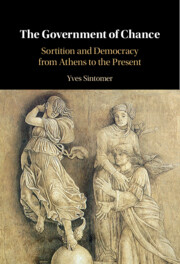Book contents
- The Government of Chance
- The Government of Chance
- Copyright page
- Dedication
- Contents
- Tables
- Acknowledgments
- Note on the Text
- Introduction
- 1 Democracy, Modern and Ancient
- 2 Sortition’s Second Birth in the Middle Ages and the Early Modern Period
- 3 The Disappearance of Sortition in Politics
- 4 The Return of sortition
- 5 Sortition and Politics in the Twenty-First Century
- References
- Index
3 - The Disappearance of Sortition in Politics
A Historical Enigma
Published online by Cambridge University Press: 18 February 2023
- The Government of Chance
- The Government of Chance
- Copyright page
- Dedication
- Contents
- Tables
- Acknowledgments
- Note on the Text
- Introduction
- 1 Democracy, Modern and Ancient
- 2 Sortition’s Second Birth in the Middle Ages and the Early Modern Period
- 3 The Disappearance of Sortition in Politics
- 4 The Return of sortition
- 5 Sortition and Politics in the Twenty-First Century
- References
- Index
Summary
Chapter Three tackles the historical enigma of the disappearance of sortition from politics following the French and American revolutions. First, it highlights the “great divergence” between China and the West on this issue, the former using sortition (jointly with imperial examinations) until the beginning of the twentieth century. Next, it unearths the causes of the two-century partial eclipse of random selection in Western politics, at the same time as the technique was employed for the appointment of trial juries. In fact, the random selection of juries was linked to the idea that jurors were interchangeable sources of common sense. On the contrary, the Swiss debate that was waged during the revolutionary period at the turn of the eighteenth century shows that the new rationalist ideas that emerged with the advent of modernity and the Enlightenment viewed the use of chance as a blind and irrational vestige of the past. At that time, the notion of the representative sample, which is familiar to contemporary readers, had not yet been developed. Consequently, even those who defended a descriptive form of representation, where representatives sociologically resemble the people they represent, could not lay claim to sortition when defending their ideal.
Keywords
- Type
- Chapter
- Information
- The Government of ChanceSortition and Democracy from Athens to the Present, pp. 125 - 187Publisher: Cambridge University PressPrint publication year: 2023

